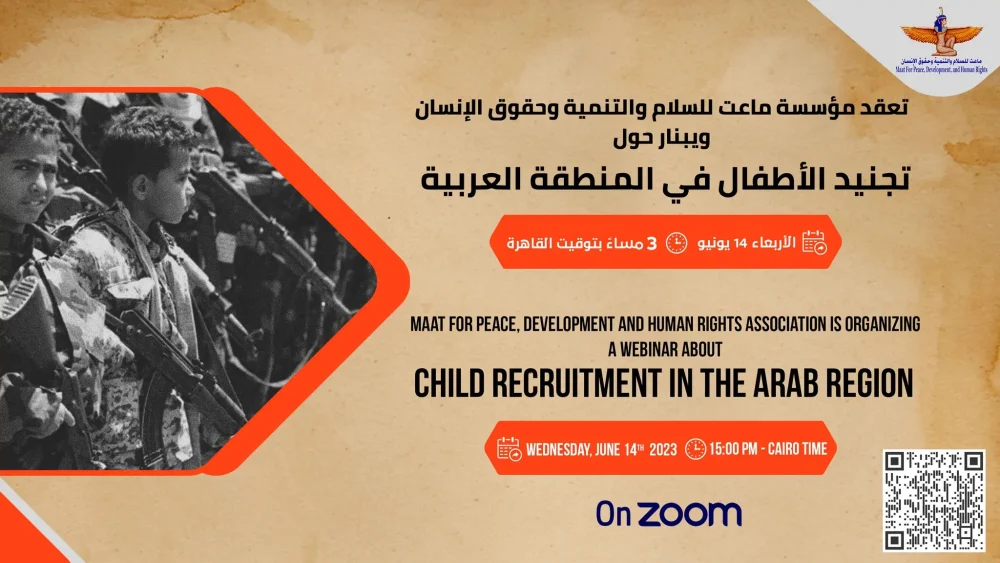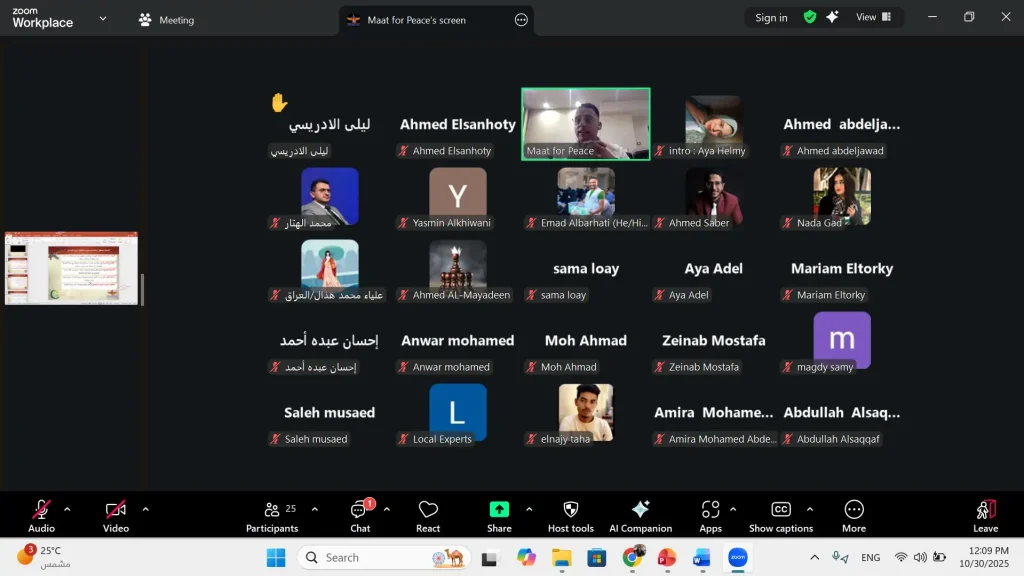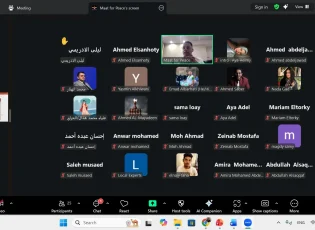Maat for Peace, Development and Human Rights held, on wednesday, June 14, 2023, an event entitled "Children's Recruitment in the Arab Region", in the presence of a number of experts on human rights and children in the Arab region; including Mr. Ayman Okeil, President of Maat for Peace, Development and Human Rights; Mr. Naji Moulay Lahsen, Executive Director of the Network of the Independent Commission for Human Rights in North Africa; Mr. Abdo Ali Al-Hudhaifi, head of the Mayon Human Rights Organization; Ms. Siwar Madkouri, a human rights activist and a specialst in international law; Dr. Jackline Rashad, a Child Protection Program Officer at Save the Children Organization; Ms. Hadeer Maher, an expert on combating human trafficking in the Middle East and North Africa; Ms. Shahd Creed, a researcher at the United Nations Children's Fund and Motherhood Organization (UNICEF) and representative of the Republic of Tunisia in the Arab Parliament for the Child (APC); Ms. Ghada Charrad, a human rights activist and participant in the Regional Cooperation on Migration Policies, and Ali Muhammad, event moderator and Deputy Director of the International Mechanisms Unit at Maat.
This event focused on the international legal framework for protecting children from recruitment in the Arab region; the challenges facing the reintegration and rehabilitation of former child soldiers; as well as the risks resulting from child recruitment such as sexual exploitation, killing, and maiming. According to speakers, recruitment of children is still widely practiced in Yemen by the Houthi militia, in Somalia by the Al-Shabaab movement, and in Algeria by the Polisario movement in Tindouf camps.
Ayman Okeil, President of Maat, said that the phenomenon of child recruitment is widely practised everywhere, including the Arab region where armed conflicts are rampant, especially in Yemen, Somalia, and Sudan. In this context, Okeil pointed to the challenges facing the integration and rehabilitation of children, such as limited compliance with the United Nations Action Plan to Prevent Child Recruitment. The Houthi militia in Yemen signed an action plan with the UN Special Representative of the Secretary-General for Children and Armed Conflict (CAAC), on April 18, 2022, in order to stop child recruitment within a six-month deadline after identify all recruited children under 18 and integrating them back into society. Howere, the militia has neither implemented these requirements nor put the plan put into action yet. Instead, Okeil warned that the Houthi rebels are still recruiting minors and utilizing summer camps to radicalize and indoctrinate minors, so that they can prepare them to become soldiers, and he demanded the establishment of mechanisms to pressure terrorist organizations to stop chil recruitment.
For his part, Naji Moulay Lahsen, Executive Director of the Network of the Independent Commission for Human Rights in North Africa, affirmed that armed groups in the Arab region continue to recruit children and separate them from their families, and touched upon the existence of training camps for child soldiers in the Polisario-controlled Tindouf camps in Algeria and in Al-Shabaab-contolled areas in Somalia. Moulay added that there is a consensus that the forced recruitment of children constitutes a war crime according to the International Criminal Court, and demanded the immediate release of all children recruited by armed groups and the need to hold accountable all countries providing armed groups with weapons that may end up in the hands of children.
In the same context, Siwar Madkouri, a human rights activist and a specialst in international law, discussed the crime of recruiting children by the Polisario militia in Tindouf camps, indicating that the residents of Tindouf are deprived of the right to movement, and children may get separated from their families and abducted from their homes, putting their lives at risk. Madkouri demanded that the Polisario Militia be placed on the UN Secretary General's annual List of Shame on armed groups that forcibly recruit children as soldiers.
Abdo Al-Hudhaifi, head of the Mayon Human Rights Organization, said that the process of recruiting children in Yemen, particularly by the Houthi militia, is unique compared to other countries in conflict due to the involvement of institutions of education, security, military, religion, and social affairs in the recruitment processess. Al-Hudhaifi added that in the past eight years, 7,000 child soldiers have been killed by the Houthi militia. Besides, he highlighted the summer camps controlled by the Houthi militia to attract and recruit minors, adding that the United Nations is not willing to stand against the militia, heedless of the lives at stake in favor for carrying out its programs in the Houthis-controlled regions.
Jackline Rashad, a child protection consultant at Save the Children, said that the psychological disorders of children resulting from war and recruitment need new strategies for treatment, explaining that the psychological rehabilitation is the valuest service that can be offered to children in order to help them reintegrate into societies and rehabilitate. Shahd Karad, a researcher at the United Nations Children and Motherhood Organization, highlighted the sharp increase in the recruitment of child soldiers in recent years, with the number reportedly tripling. Therefore, she called for the need to provide mental health services, psychological support, child protection case management, family tracking and reunification, in addition to the need to adopt Arab and African national policies to protect children from recruitment by terrorist groups, taking into account the cultural and economic specificities of the Arab region.
Finally, all speakers stressed that the child's place is in the school and not in the training camps, and called for the mobilization of financial resources to implement programs for the integration and rehabilitation of former child soldiers, with the need to put in place effective mechanisms to stop terrorists and other groups from recruiting children. Participants also demanded that the Arab League should play a broader role in the issue of integration and rehabilitation of former child soldiers in particular, and in issues related to the Arab Charter for Human Rights in general.
shortlink: https://maatpeace.org/en/?p=38774












